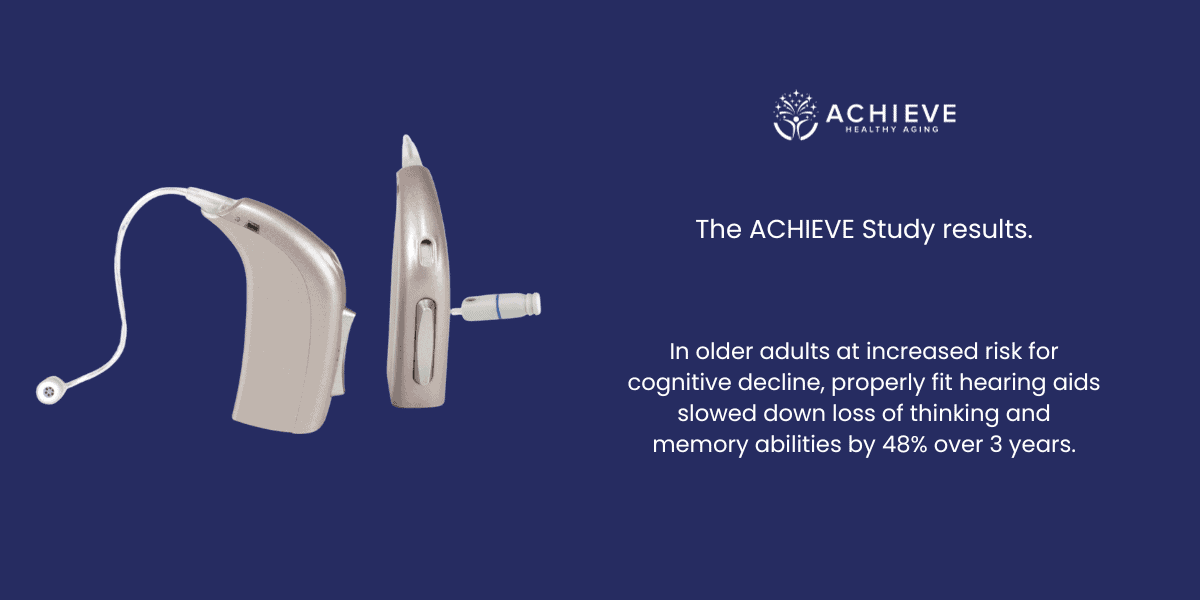I am so excited to share with you what I learned at the Academy of Doctors of Audiology conference held a few weeks ago in Bonita Springs, Florida. Frank Lin, M.D., Ph.D. Director, Cochlear Center for Hearing and Public Health, Johns Hopkins Bloomberg School of Public Health, Professor of Otolaryngology presented the finding of the ACHIEVE (Aging and Cognitive Health Evaluation in Elders) study that was published in The Lancet September 2, 2023.
Hearing loss is associated with increased cognitive decline and incident dementia in older adults. Dr. Lin also discussed the negative effects of loneliness, social isolation and depression that are also associated with hearing loss. This study aimed to investigate whether a hearing intervention (hearing aids) could reduce cognitive decline in cognitively healthy older adults with hearing loss.
“The ACHIEVE study is a multicenter, parallel-group, unmasked, randomized controlled trial of adults aged 70–84 years with untreated hearing loss and without substantial cognitive impairment that took place at four community study sites across the USA. Participants were recruited from two study populations at each site: (1) older adults participating in a long-standing observational study of cardiovascular health (Atherosclerosis Risk in Communities [ARIC] study), and (2) healthy de novo community volunteers. Participants were randomly assigned (1:1) to a hearing intervention (audiological counselling and provision of hearing aids) or a control intervention of health education (individual sessions with a health educator covering topics on chronic disease prevention) and followed up every 6 months. The primary endpoint was 3-year change in a global cognition standardized factor score from a comprehensive neurocognitive battery.”
To save you from the intense labor of reading the full article printed in The Lancet, I will share what Dr. Lin presented. For healthy de novo community volunteers, those that are healthy, active, with no underlying medical concerns that are not high risk for cognitive decline found the use of properly fit amplification showed no significant improvement in cognitive function or brain image studies. However, for those participants with underlying health concerns that are high risk for cognitive decline, properly fit amplification (hearing aids) reduced the risk for cognitive decline by 48%. I don’t know about you…but this is amazing and confirms that what we do is making a huge impact, not only in improving immediate communication, but reducing the negative correlation of hearing loss and loneliness, depression social isolation and cognitive decline/dementia.
As a result of these fantastic results, The Johns Hopkins Cochlear Center for Hearing and Public Health launched the Know Your Number campaign to introduce the Hearing Number as a universal tool for understanding and talking about hearing.
On average, a person will have their hearing evaluated at birth as mandated by the universal newborn hearing screening program, then yearly checks until kindergarten. Maybe a few more screenings before the age of 12…then NOTHING until Medicare Wellness check unless there is an apparent problem.
We know the importance of hearing. Stay tuned for next month’s issue as I explain more about the initiative to Know Your Number. We know and understand our numbers. I know my blood pressure numbers, my weight, my cholesterol, my sugar number, my vision numbers and now I know my hearing number.
If you would like to learn more, give Jamie or Diane a call at 704-633-0023. Remember to visit our website: www.hearingsolutionsofnc.com and like us on Facebook. Dr. Mussler, Jane, Cheryl, and I look forward to seeing you soon. We wish you a very happy, healthy holiday season.

